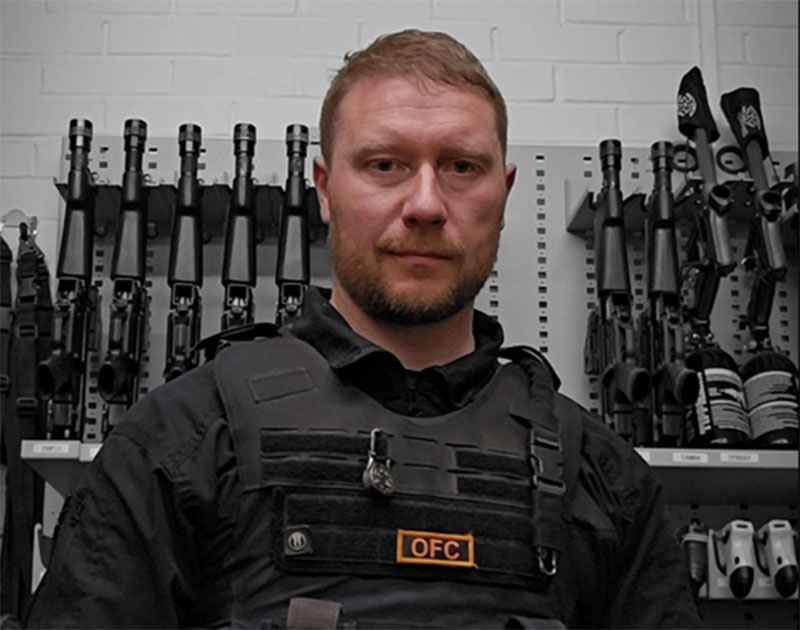To mark Mental Health Awareness Week, Police Superintendents’ Association Disability Lead Superintendent Paul Burrows reflects on his own mental health journey and provides advice and insight on supporting those in the workplace who may need help
The adage that ‘what doesn’t kill you makes you stronger’ is powerful and poignant.

We hear so much in the media about those who are taking a break from sport, the arts or just life in general to reflect upon their mental wellbeing. Having recently been on this journey I thought there might be some beneficial insights I could provide to those who are perhaps fortunate enough not to have been such a traveller. Or perhaps validation to those who have like me, travelled. I am stronger but changed. I now, for example, have a new definition of ‘good friend’ – it is someone who looked out for me and helped me realise they cared and that people cared about me. Perhaps these words will engender more good friends?
I have no doubt that there may be some cynicism about wellbeing breaks. They can come across as being ‘de rigueur’. However, through lived experience I can vouch for the importance of looking after one’s mental health before you get to crises. This wellbeing MOT is critical. But how do you realise you need to do this? Are you failing to sleep? Being incredibly tired at work, or even falling asleep? Are you irritable and having arguments – usually at home? Suffering from palpitations? Light-headed? Demonstrating road rage? Not taking breaks or your rest days? Always thinking about work, even on holiday?
The reasons I struggled with my own mental health (I really don’t like the term ‘illness’, though someone far cleverer than me will no doubt explain that it is an illness), are many and varied and deeply personal. The underlying factor was burnout, the second was conversations which, because of my own neurodivergence, I failed to contextualise. These were the first dominos.
Also, as a Strategic Firearms Commander (SFC), Advanced Public Order Commander (APOC) and on-call Superintendent, I worked many additional shifts which meant I rarely got the rest I needed. I am not unique. This burnout exacerbated other events and conversations that tipped me over the edge to amongst other things, a marriage breakdown.
You don’t want to get to where I was, so hopefully these few words may halt a slide.
I am the PSA disability reserved representative and have been open about my own autism. Whilst off work sick, I continually asked myself the question of whether I was creating my own self-fulfilling prophecy. The statistics speak for themselves: in the UK, 66% of autistic adults have thought about taking their own lives, and 35% have attempted suicide. Around 1% of people in the UK are autistic, yet 15% of people hospitalised after attempting suicide have an autism diagnosis. If you reflect upon how many of your own team have a diagnosis or consider themselves to be autistic, it might well be worth looking at your long-term sickness figures for anxiety and depression in a different way. I also pose the question: do you know who your team is? Our role as managers is critical – what are we missing that is hiding in plain sight? Do we foster relationships that are genuine and sincere? The number of conversations I have had with neurodivergent colleagues from other Forces would suggest these relationships sometimes still need to be built. Otherwise, individuals are left questioning their own self-worth.
Having been away from work, I am stronger for my experience, but changed; and changed quite fundamentally. It is for this reason that I write about my journey in the hope that it may help someone either by ensuring they or perhaps even you get the support needed.
So, what have I learned?
The first thing is that it must be accepted that you are not well, and that support is required. Unfortunately, the crises can bite you before you consciously accept this fact. Look out for the triggers. I had many but didn’t realise what they were. I was told I looked grey, but this was only said to me when I came back to work. I didn’t take my rest days in lieu (RDILs) after working on-call as I needed to be at that meeting; I didn’t take my 11 hour break between shifts entitlement because I needed to be at work. I constantly checked my emails when off duty. Really?
So, what is the first step?
A good friend of mine who had his own period off sick with ‘stress’ said to me that after accepting I was not well, I also needed to accept that I would never be the same again. Fact. Another friend said that he came to realise before his retirement just how many people in the police service are hanging on to their mental health by their fingernails. Both these individuals were superintendents, so this issue is very real.
My concern is that as we see more and more colleagues getting promoted to senior roles relatively early, and with extended service, they may well be in these ranks for decades. The pressures will only mount and unless the on-call and specialist cadre burden are shared equally there will be too many more who develop lived experience of mental health crises. Teamwork is key, at all levels and in all roles.
Being on the PACE (Custody) and SFC on-call rotas and being a Silver Public Order Commander, I accrued a large number of RDILs. I couldn’t take them and still be at work to do my day job. I was burned out, my life home-life collapsed, and I went off sick.
I’m not unique in the level of stress and demand I was facing. PSA statistics show alarming levels of mental ill-health amongst our members, as do that of Oscar Kilo and other policing organisations. This is also not unique to the superintending ranks. Our colleagues at the Police Federation regularly share evidence of the toll of policing across the workforce.
When you reach burnout, on some days all you can do is set yourself a single task: that may be get out of bed, clean your teeth, or go for a walk. This may be all you can achieve. The theme of this year’s Mental Health Awareness Week is ‘moments for movement’. I thoroughly believe that exercise is critical to mental wellbeing, and if you can encourage the individual to do one thing, it is exercise – outdoors, in the daylight. I don’t mean train for a marathon, it may be as simple as a walk, however slow, around the block – but something in the daylight.
It is also worth having a look at how wellbeing support is presented on your Force website. All people in crises will want is the number to call and in what circumstance, in short sentences. It is simple. They are under stress. Do you need help? Phone this number. It also needs to be clear what level of crises the person you are phoning can support. I was rejected from a number of services because I was, at the time, too ill. There are significant gaps in our service provision, and most of what is offered is lower-end conversation therapy – which is hugely important, but please don’t assume the services available will meet all needs. Also – and I can’t say this enough – the person may need help navigating this journey.
Reach out. I have reflected a lot about my own experience and how I have previously failed friends who were off sick. I thought, “Someone else will speak with them”, “They don’t want to speak to me, there is a named welfare contact and I don’t want to pry”. They are all good reasons to justify not reaching out. However, the person who is struggling will be the arbiter of who they want to speak to. I was truly humbled by the number of people who reached out to me and who made themselves available for a coffee and a chat. This will not be forgotten. As an autistic person, I don’t have a wide circle of friends, in fact I would have said I didn’t really have any friends. I know otherwise now.
So, you have reached out. What should you do? It is all about listening and not necessarily about providing solutions. Being off long-term sick can be isolating and lonely; everyone is different and will have a different number of outside-work social networks to reply upon, but some may have none. Particularly those who live and breathe work. Dare one suggest it, but those who are autistic may be particularly likely to have a limited network of friends to speak to. A single contact at whatever interval your Force requires from the welfare contact may not actually be enough.
Returning to work. I read some years ago about the importance of having someone walk into work with you on that first day back. To meet you in the car park or even away from work and physically walk you to where you work and perhaps sit with you and have a cup of tea whilst you settle in. This was, and is, brilliant advice. I know individuals who have sat in car parks in tears not feeling able to walk into work. These are robust people. Don’t underestimate the thoughts going through the individual’s head, matters that may seem trivial: what will people think of me? Will I be welcomed back? Why do people think I was off sick? It is also worth reflecting on how many hours the person will return to work for in the first instance and what the nature of their duties will be. Did anyone think about turning off their email or recording an out of office reply whilst they were away? How many computer-based training packages are they required to complete? It all adds up and can become overwhelming. The process of re-acclimatisation may take weeks. It will also be exhausting.
My final observation is: have you considered how many of those who are off work on long-term sick leave with anxiety and depression may be undiagnosed (or indeed diagnosed) neurodivergent? There is a considerable body of evidence that indicates that those who are ND are more likely to suffer from anxiety and depression and seven times more likely to attempt or commit suicide. The view is that 20% of us/our colleagues in the service are ND, so there may well be an additional consideration here to be made. The question I find myself posing a lot is, “Do you know who your team are?” If not, if could be more beneficial than you ever imagined to find out. ∎
This blog was originally published on the PSA website – it is reproduced here with kind permission of the author

